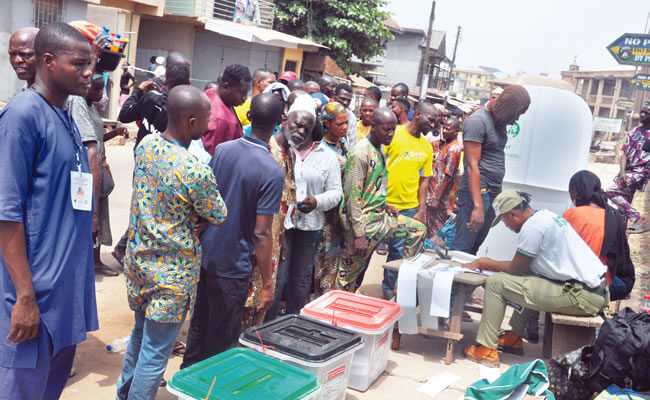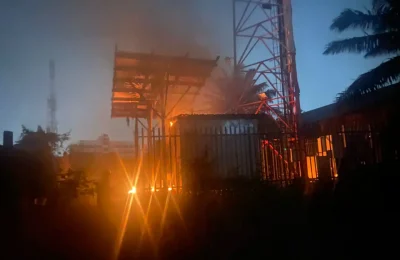
In this piece, WALE AKINSELURE examines the trend of voter turnout in Nigerian elections since 1999, putting into perspective last Saturday’s presidential and National Assembly election.
The first round of polls in the 2023 general election held last Saturday. As registered by the Independent National Electoral Commission (INEC), 18 political parties have candidates for president, national assembly, state Houses of Assembly seats. The 2023 general election is the seventh since Nigeria began its present democratic experience in 1999. Several Nigerians identified the crucial nature of the elections in the history of the nation, with a former Secretary General of the United Nations, Chief Emeka Anyaoku describing the 2023 election as a watershed. As a result, individuals and groups made several calls on Nigerians to actively participate in the electoral process, particularly turn out massively on Election Day. Those callers weaved their call around the fact that for any democracy, election is crucial as it affords citizens the opportunity to wield their power and elect their representatives. But, over the years, elections in Nigeria have been marred with apathy, rigging, allegations of votes being bought and sold.

Apathy has its source in Greek, plainly meaning “without feelings.” Voter apathy simply refers to the lack of enthusiasm of the people towards the electoral process, particularly voting. The resultant effect of voter apathy is poor voter turnout. Statistics show that the voter turnout has continued to take a downward spiral since the year 2003. While the turnout was 69 percent in 2003, it was 58 percent in 2007, 54 percent in 2011, 43 percent in 2015 and 35 percent in 2019. In the last off-season election held in Osun, out of over 1,955,657, just over 800,000 turned out on Election Day.
Ahead of the elections, politicians, political observes, leaders of thought continued to call on Nigerians to shun their political analysis, brickbats on the social media and come out on Election Day to vote their candidates, in accordance to their conscience. Moreover, calls for Nigerians to participate in the forthcoming elections have been premised on the saying by the philosopher, Plato, that: “One of the penalties for refusing to participate in politics is that you end up being governed by your inferiors.”
Political observers identified that the reasons for apathy include the view that their votes do not really count, that the outcome of most elections are pre-determined, that the electoral process is replete with violence, that the political class is undeserving of its time because of their perceived insincerity to electoral promises, consistent failure of political parties and candidates to deliver on their promises.
Ahead of the 2023 elections, Nigerians even got more disillusioned, hopeless about the current state of things in the country and lacked enthusiasm to turn out for elections. Nigerians are disappointed that government seems not to understand the hardship faced by the common Nigerian. Just before the elections, Nigerians were treated to another round of hardship having to grapple with the naira swap policy, intermittent fuel scarcity, insecurity epitomized by cases of kidnapping, killing, armed robberies. The woes of the country were evidenced by the continued exit of Nigerians, especially professionals, in what is now popularly called “Japa.” But, some observers argue that Nigerians should channel this displeasure at the present situation by turning out enmasse on days of election to vote for candidates that will engender the desired turnaround. Moreover, elections offer an opportunity for Nigerians to change leadership that they displeased with and vote in the one they believe will deliver.
Over the years, the pictures on election days have been those of adults, elderly people queuing up under the sun for hours waiting to cast their vote. Many political analysts have wondered why the youths, in spite of their vibrancy, continue to exhibit apathy towards trooping out on Election Day to vote. The worry was that youths, on Election Day, are wont to playing football on the streets, sitting in front of their television sets to watch films or stay at home playing games. In today’s digital world, the tendency is for the youths to stay online, engage in social interactions from start to close of polls on Election Day. Consistently, many called for a change in this trend towards the youths actually taking the lead and being the majority at polling units on Election Day.
The youths made a bold statement about their keenness to participate in the 2023 general election as that population led from the first week of the first quarter of the Continuous Voter Registration (CVR) exercise. It was not a fluke as out of a total of 9,518,756 valid newly registered voters, 7,286,871, representing 76.56 percent, were youths between age 18 and 34 years. Chairman of the Independent National Electoral Commission (INEC), Professor Mahmood Yakubu, in his address at Chatham House, London, clearly said that the 2023 general election is an election for the young people. The statistics from INEC show that out of the 93.4million registered voters, 70.4 million are young people between the ages of 18 and 49 years.
Going by the statistics, the youths are expected to be the decider of the ongoing elections. In recognition of the power of the youths, with many on the social media, several of the presidential candidates used the social media to drive their campaigns. Electoral battles continue to be fought on social media by supporters of the various presidential candidates. The charge from stakeholders is that the youths shift the battle from the social media to going to polling units on Election Day to cast their ballot.
But, in spite of the various measures and increased calls for participation, the turnout in this election has even taken a further downward trend. Statistics of turnout in last Saturday’s election shows that voter apathy has worsened from the 35 percent in the 2019 election. The statistics show that the turnout in the 2023 election has oscillated between 20 percent and 30 percent across states. In Niger State, registered voters were 2,698,344 while accredited voters on Election Day was 827,416 voters. In Benue, registered voters are 2,777,727 while accredited voters was 804,189. In Akwa Ibom, registered voters were 2,357,418 while accredited voters was 594,450. In Oyo, the number of registered voters was 3,237,310 voters while number of accredited voters was 854,439. In Kaduna, the number of registered voters was 4,335,208 while accredited voters are 1,418,046. For Kebbi, the number of registered voters is 2,032,041 while voters accredited on Election Day was 599,201. In Kano, registered voters were 5,921,370 while accredited voters were 1,769,525. In Zamfara, registered voters were 1,926,870 while valid votes in Saturday’s election were 502,923. In Sokoto, registered voters were 2,172,056 while accredited voters were 619,492.
Political observers wonder whether apathy in Saturday’s election is due to the usual reasons to include the view that their votes do not really count, that the outcome of most elections are pre-determined, that the electoral process is replete with violence, that the political class is undeserving of its time because of their perceived insincerity to electoral promises, consistent failure of political parties and candidates to deliver on their promises. While this year’s election had instances of violence at some polling units leading to cancellation of votes, Commonwealth observers say the election was largely peaceful. The group led by a former president of South Africa, Thabo Mbeki, said his team observed and was satisfied with the process of accreditation, voting, counting and results aggregation in the Federal Capital Territory, Benue, Edo, Kano, Lagos, Ondo, Rivers and Sokoto States. With international groups scoring the election as peaceful and INEC making efforts to increase confidence in the electoral process, stakeholders continue to raise concerns about why voter apathy persists especially with another round of elections scheduled for Saturday, March 11.
READ ALSO FROM NIGERIAN TRIBUNE







